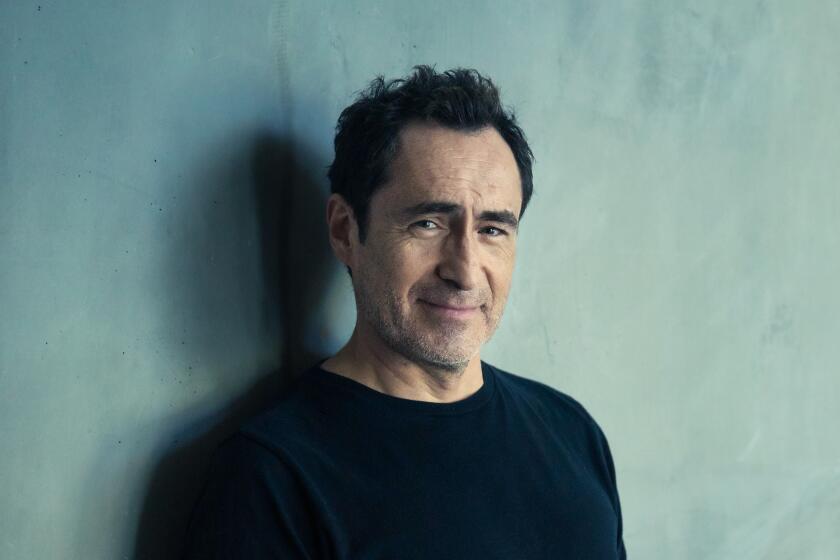Which new vampire show is right for you this spooky season? Our critic weighs in
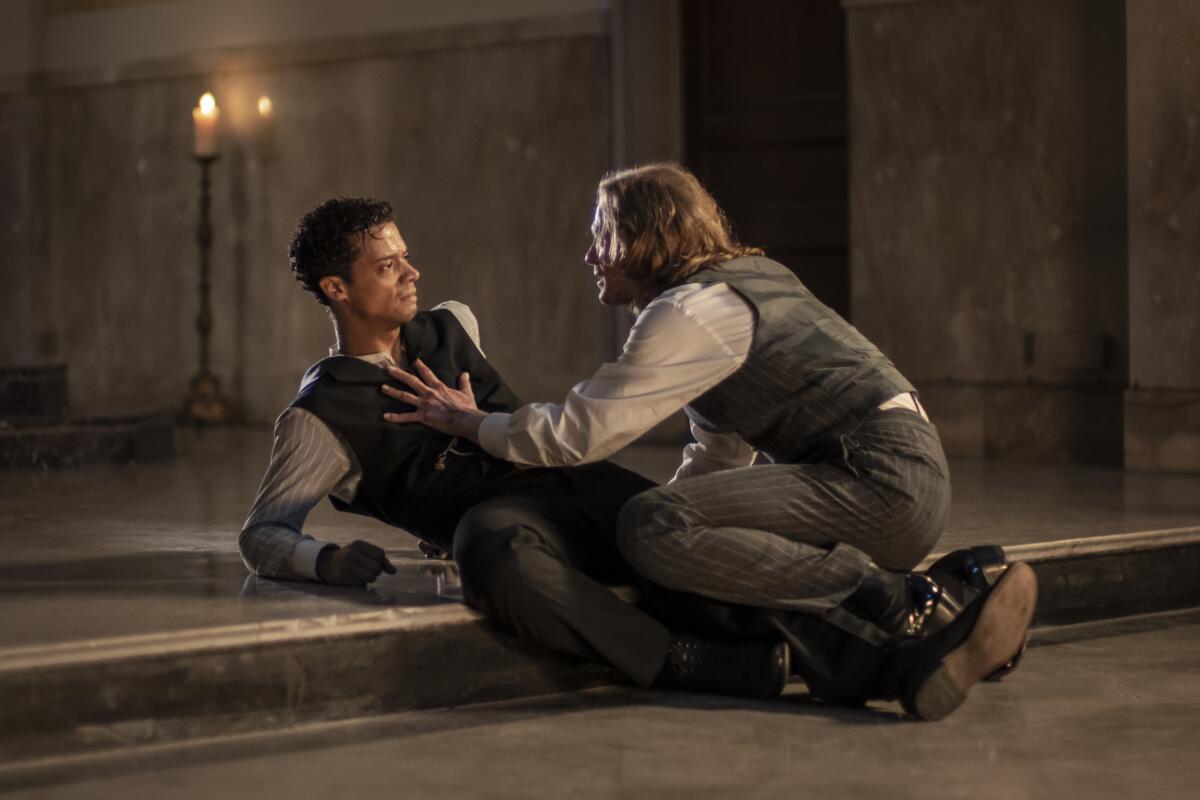
- Share via
Vampires are back, though given the immortality, can they ever really go away? Last month saw the debut of Peacock’s “Vampire Academy”; “What We Do in the Shadows” continues to be one of the best and funniest shows on television. And in the first days of October, three additional vampire series, in much different flavors, have crawled from their coffins onto the small screen.
“Anne Rice’s Interview With the Vampire” began Sunday on AMC; “Reginald the Vampire” premieres Wednesday on Syfy; and “Let the Right One In” arrives Sunday on Showtime.
For the record:
8:51 a.m. Oct. 6, 2022An earlier version of this story said “Let the Right One In” airs on AMC and is available on Prime Video. It is on Showtime and the Showtime app.
All have literary, or “literary,” antecedents. “Let the Right One In” comes from the novel by John Ajvide Lindqvist; “Reginald the Vampire” descends from Johnny B. Truant’s series of “Fat Vampire” novels; and “Anne Rice’s Interview With the Vampire” adapts, um, Anne Rice’s “Interview With the Vampire.”
I can’t speak of how true “Reginald” is to the page, but the other two make substantial changes and additions to the source material in order to make stories into series, and in the Rice show, to transform its cursed protagonist from a 18th century slave-holding plantation owner to a 20th century person of color. (Seems smart.)
What accounts for the vampire’s undying popularity? Unlike many other famous monsters of filmland, they have agency and intelligence. They are usually hot and sexy, often cultured and well-read. They have their challenges — sunlight, stakes, endless years to fill — but when the sun goes down, they get around; they can mix with people, take in a show, run a business, whatever. As characters, they have myriad possibilities, “vampire” being a category and not, like Frankenstein or King Kong, an individual; and unlike many monsters, they are not particularly pitiable. Or, rather, they are romantic, their particular brand of social apartness catnip to moody adolescents.
In the 125 years since Bram Stoker published “Dracula,” and the century since director F.W. Murnau ripped him off for “Nosferatu,” bloodsucking stories have encompassed tragedy, comedy, the arty and the exploitive, straight horror and soft porn, teen romance and cartoons. The undead come in all ages, shapes, sizes, colors, sexes and genders. They are better and worse people, with vampires who are basically heroic pitted against those who are merely sociopaths. By and large, they are killers, which is not a likable trait, although some concentrate on “deserving” victims — mortals, as each of these new shows will remind you, can be really terrible people — and others get by on animal blood, though even that can lead to some nasty scenes.
Alan Tudyk stars as an alien stranded on Earth in the sci-fi dramedy, which premieres Wednesday on Syfy.
My favorite among these shows is “Reginald the Vampire,” which feels like a kind of tonal companion piece to Syfy’s great “Resident Alien,” with its winning combination of comedy, suspense, likable characters and real feeling. Created by Harley Peyton, whose TV career goes back to the original “Twin Peaks,” it focuses on Reginald (Jacob Batalon), who mans the counter at the Slushy Slack, where he is abused by manager Todd (Aren Buchholz) and harbors a shy crush on co-worker Sarah (Emily Haine). He develops a friendship with a customer, Maurice (Mandela Van Peebles), who encourages him to ask Sarah out, and who we already know is a vampire. In an emergency, to save Reginald’s life, he makes him a vampire too.
The bad, but also good, news is that vampirism enhances only one’s natural abilities, so that while Reginald will never be super strong or superfast, he does become super smart and develops a mental power that no other vampire in history has ever possessed.
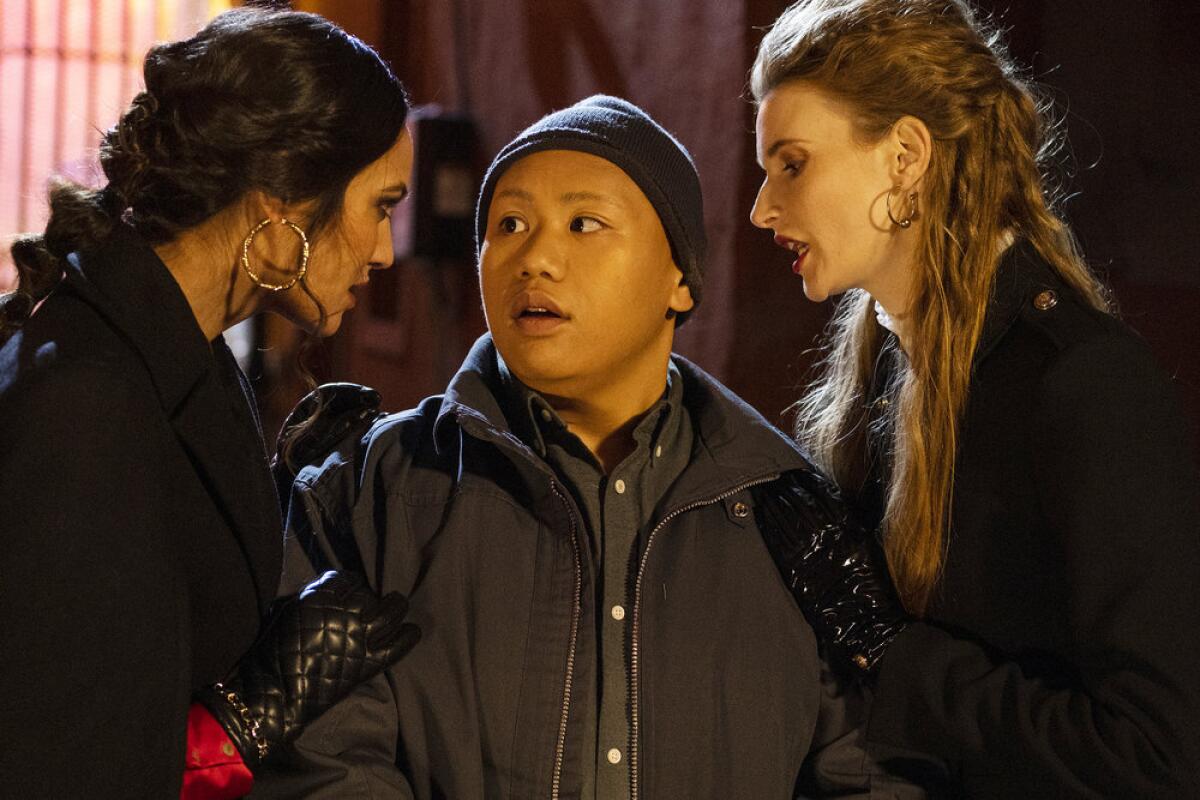
There is the suggestion that his life will be better now that he’s dead, and “Reginald” keeps it light — vampires don’t have to kill their victims, for one thing, and Reginald is no less sweet than he was when alive.
Darker skulduggery is at work among other creatures of the night. Maurice, a bit of a rebel, is temperamentally at odds with his snobbish, rule-bound kin, especially Angela (Savannah Basley), the regional director of the Midwest Chapter of the Vampire Council of America.
They know each other from the 1970s, when he was still mortal and they were working for social justice. “This isn’t my first revolution,” she told him then, but she now adopts the attitude that “perfection is what keeps our nation safe,” while Reginald, who as the book series’ title indicates is overweight, is “defective, grotesque and an insult to our purity.” This puts a target on Reginald’s back.
Adapted by Rolin Jones and the first product of a deal that encompasses 18 Rice novels — no surprise that AMC has already renewed it for a second season — “Anne Rice’s Interview With the Vampire” proposes a sort of sequel to/retelling of “Interview With the Vampire” that keeps the main characters substantially the same while customizing the details and the context.
Eric Bogosian plays Daniel Malloy, the present-day older version of the nameless “boy” who in San Francisco 49 years earlier had recorded the life and post-life story of Louis de Pointe du Lac (Jacob Anderson). Here, he’s more adversarial — you don’t waste Eric Bogosian on nods of agreement — a former drug addict-turned-successful journalist-turned-Parkinson’s patient. As the series begins, he receives an invitation from Louis, bringing him to a minimalist penthouse in Dubai to “revisit the project boyish youth prevented us from finishing.”
The good news, says author Anne Rice, is that her 1976 best-seller “Interview With the Vampire” is finally scheduled to go before the cameras in mid-October and be released by Warner Bros. next summer or fall.
As in Rice’s novel, Louis becomes the immortal companion of vampire Lestat de Lioncourt (Sam Reid), a long-haired Frenchman who has fetched up in New Orleans. (The words with which Louis describes his transformation come straight from Rice: “The blood came as a dull roar at first, and then a pounding, like the pounding of a drum, growing louder and louder as if some enormous creature were coming through a dark and alien forest…”)
Eventually, they will be joined by Claudia (Bailey Bass), more of a tween than the novel’s 5-year-old girl, who, unlike Louis — who has qualms about killing harmless strangers — takes to vampirism like a bat to a bat cave. Most everything else in the episodes out for review is new, or reimagined, and Jones builds in the idea that Louis’ original narrative — which the character dismisses as “a fever dream told to an idiot” — might be unreliable.
The story now begins in 1910; Louis, who administers the family trust — “capital accrued from plantations of sugar and the blood of men who looked like my great grandfather but did not have his standing” — also runs a string of brothels, and as a Black man of economic importance, he mixes with patronizing white businessmen and politicians who find him useful as long as he knows his place. (Louis will “Yassuh, suh” them.)
The new casting allows for lessons in the history of race relations and adds a new wrinkle in the couple’s power dynamics, while homoerotic subtext is made explicit text: “You could be a lot of things in New Orleans, but an openly gay Negro man was not one of them.”
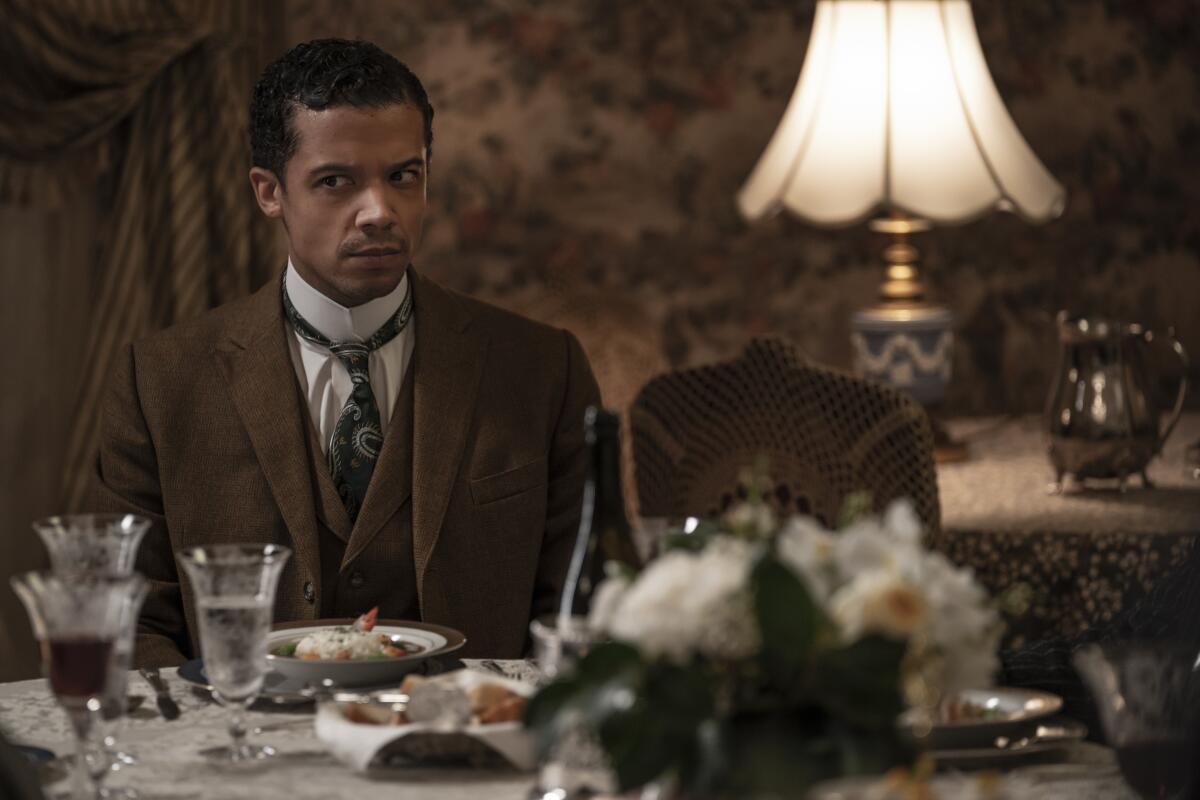
More of a historical romantic melodrama than a profound tragedy — not a sin and more likely to draw viewers back — it’s well-made with some fine performances and evocative locations. (One reason to set your story in the early 20th century in the French Quarter is that it survives.) There is as much domestic drama as there is vampire business, and the series has a welcome comic edge, especially once Claudia joins the family. There is also tap dancing and a scene, which I take to be an homage to “Back to the Future,” in which Lestat, sharing a piano bench with Jelly Roll Morton, “improvised the melody for what would later become ‘The Wolverine Blues.’”
What “Let the Right One In,” created by Andrew Hinderaker, preserves from its book and film iterations is the friendship between a picked-on 12-year-old boy and the forever-12 girl who moves in next door. Everything else in this New York City-set version — and there is much else, involving detectives, scientists and drug dealers — is addition and revision.
The ‘Better Life’ Oscar nominee and now Showtime star calls himself ‘blessed.’ But he also knows good fortune isn’t the only secret to his success.
Here the boy is Isaiah (Ian Foreman), who likes to do magic tricks, which makes only a negative impression on his peer group. His parents are separated; mother Naomi (Anika Noni Rose) is a police detective, busy investigating “a wave of brutal slayings” that have gripped the city, as a powerful new high has arrived on the street; father Frank (Ato Essandoh) is in Narcotics Anonymous and hoping to return home.
Moving in next door is Mark (Demián Bichir), whom Isaiah and Naomi encounter toting a large case, inside of which, you have already guessed, is Eleanor (Madison Taylor Baez), his daughter.
He’s on a decade-old, single-minded, morally compromised, quixotic quest to find a cure for Eleanor’s vampirism, which the series envisions as a virus, with the idea that whoever/whatever infected her might hold the key to a cure. This doesn’t make perfect medical sense, nor does Mark’s charging into dangerous situations without much to go on, but it’s a fantasy, after all.
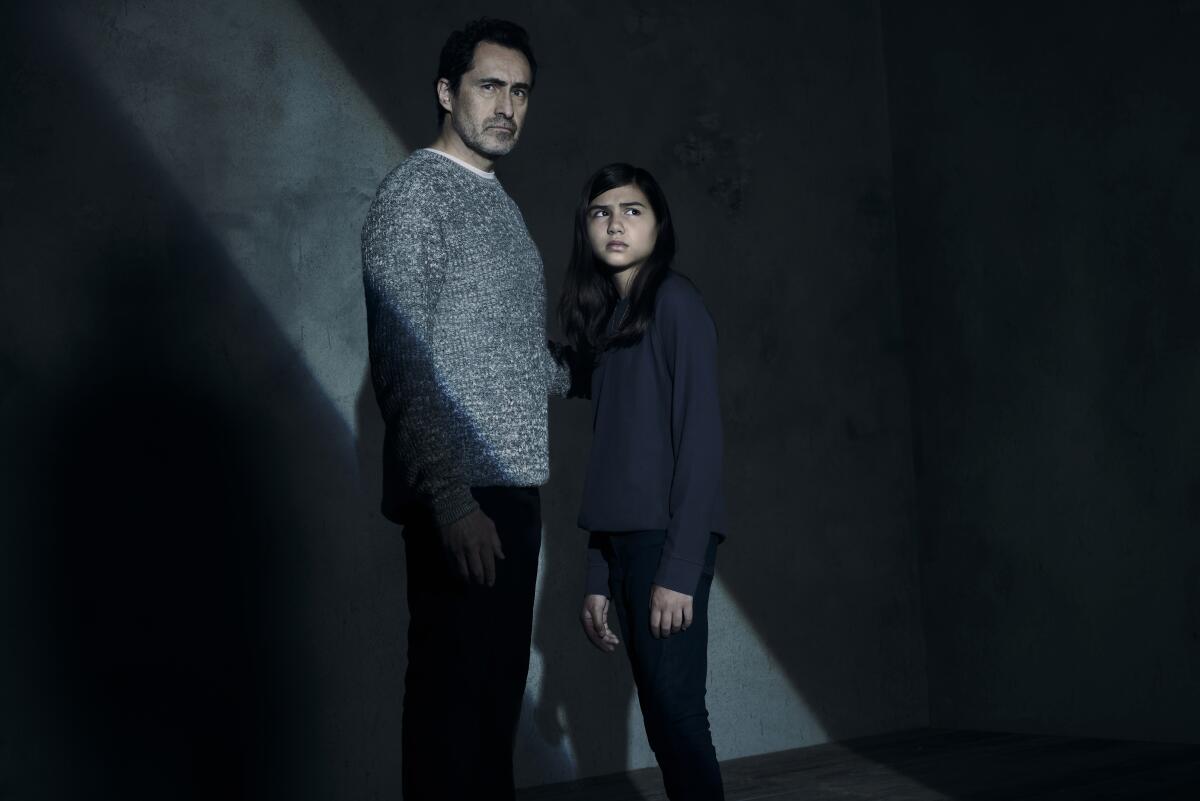
Meanwhile, dying scientist Arthur (Željko Ivanek) has put in a call to estranged scientist daughter Claire (Grace Gummer), who arrives at the family mansion-cum-laboratory to find that her brother, Peter (Jacob Buster), whom she had believed was dead, has been a vampire all these years.
Like Mark, perhaps the series’ most tragic figure, Arthur has been trying to cure his child — with science — and wants Claire to take over when he goes. These apparently parallel storylines, which account for nearly all the series’ violent and otherwise over-the-top scenes, will wrap around each other eventually.
Notwithstanding the mayhem and creepiness, which are exactly what some will come for, the adults’ plot lines can feel kind of pedestrian and undercooked, especially given how much screen time they occupy. But in that they might let Eleanor be a normal child again, you allow them. (She’s chronologically something like 22, but as a character, she’s very much 12, if a bold 12.) Still, the show is most interesting when the kids are at the center; each has what the other needs. Foreman and Baez are genuine and touching, and it’s easy to invest in their story, with fingers crossed for a good outcome. Horror without hope is just horror, and you can have it.
###
‘Reginald the Vampire ’
Where: Syfy
When: 10 p.m. Wednesday
Rating: TV-MA (may be unsuitable for children under age 17)
‘Anne Rice’s Interview With the Vampire’
Where: AMC
When: 10:20 p.m. Sunday
Rating: TV-MA (may be unsuitable for children under age 17)
‘Let the Right One In’
Where: Showtime app
When: Any time
Rating: TV-MA (may be unsuitable for children under age 17)
More to Read
The complete guide to home viewing
Get Screen Gab for everything about the TV shows and streaming movies everyone’s talking about.
You may occasionally receive promotional content from the Los Angeles Times.
